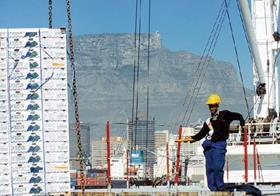
The Transnet workers' strike which has cost South Africa's export industry billions of rand is finally over, according to news agency reports in Johannesburg.
The strike ended this afternoon (Thursday 27 May) with SA Transport and Allied Workers' Union (Satawu) members accepting a new offer, Satawu deputy president Robert Mashego said.
'We have accepted... we have signed,' said Mashego. 'We are not happy about the offer per se, but we think we can live with it.'
Members will begin returning to work on Friday and everybody is expected to be back at their posts by Monday at the latest.
News that the strike has been called off has been greeted with relief in the South African fresh produce industry. However, industry leaders say the fall-out will continue and it will take weeks for the backlog in container shipping to be cleared.
With the strike over, there will be new issues to deal with following industry statements that legal action will be taken to recover financial losses suffered during the strike.
Growers and exporters who are now finally getting their containers out of the ports, where in many cases they have been trapped for more than 2 weeks, will hope that there are no serious quality problems once the fruit reaches its destination.
The Lars Maersk, which is now underway to Europe, has the bulk of these containers on board, but further delayed shipments will follow.
Shipping lines will look to normalise their schedules and many exporters will continue to move more fruit on specialised reefer vessels which have been chartered at the peak of the strike.
The Citrus Growers’ Association (CGA) says there are 26 vessels at outer anchorage off of Durban, three vessels off of Port Elizabeth and 14 off of Cape Town.
'So it is anticipated that the normalising of service to containers in Durban is far off,' CGA noted. 'The Durban port is loading the majority of citrus in break-bulk with five ships calling for Europe within this week, as well as ships brought in for Russia and the Middle East.'
CGA says it is probably advisable to continue loading a portion of citrus in break-bulk out of Durban for at least a few more weeks. 'With a backlog in tow, as far as whose boxes and how many will be accepted per ship out of Durban is another question – perhaps some caution should be exercised here for the time being.'
Meanwhile, growers and exporters who did not cover themselves for delays before departure in their marine insurance policies will have a major headache to cover their losses.
'Delay before departure is a clause which is not often found in policies written by South African brokers and underwriters,' says Hardy Sader-Diers of Hamburg insurance company SAVE. 'We include this clause in our policies and advise our customers that it is necessary to sufficiently cover their risk. In this case it is extremely relevant, and it will also be so during the next month when activities surrounding the FIFA World Cup Finals may also cause delays.'
During the strike, SAVE reassured its clients that fruit which had left the packhouse and was on the way to its destination was covered in its Marine Cargo Insurance provided that the 'delay-before-departure-clause' was agreed up front, and those who have done so should declare their consignments as normal.
'All fruit which has not been packed and is not in the process of shipment is not covered. If shipping-lines can give the exporter a definite estimated time of departure, containers can be moved forward but simply letting them go into stack where the shipment date (or plug-in conditions) is uncertain will not be covered by the Marine Cargo Policy.'



